How to Become a SEN Teaching Assistant
Want to help children with special educational needs? Our guide is here to help you out!
Want to help children with special educational needs? Our guide is here to help you out!
A special educational needs (SEN) teaching assistant supports pupils with physical, behavioural or learning difficulties with the supervision of the classroom teachers. This can be supporting a small group of pupils or one-to-one, in a special SEN school or mainstream class.
The responsibilities of an SEN teaching assistant typically involve helping the pupils’ understand instructions and school work using techniques that work for them, encouraging pupils’ confidence and independence and providing feedback and assistance to teachers. You may also be expected to accompany the pupil in their spare time or with social activities.
SEN teaching assistants will get the same training as other teaching assistants, and patience, creativity and flexibility are vital in this role as the needs of each child will differ day-to-day and from one another.
Being a SEN teaching assistant can be challenging, however it is extremely rewarding for anyone who wants to help disadvantaged children thrive in their education. If this sounds like the career for you, then read on for our tips on becoming a SEN teaching assistant.
Here are some of the key responsibilities you’ll likely deal with as a SEN teaching assistant:
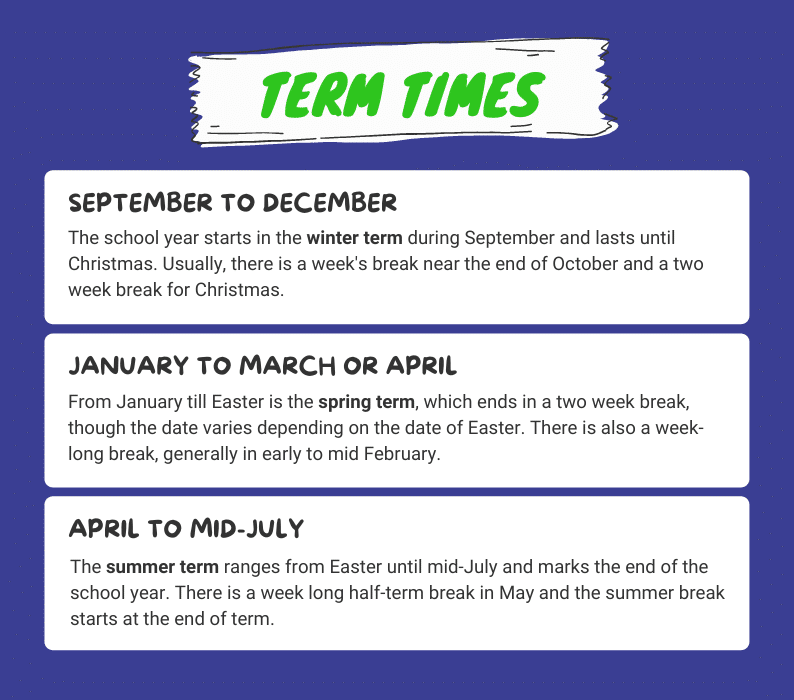
A SEN teaching assistant’s starting salary could be around £17,000 but the average salary for a SEN teaching assistant rises to around £20,000 which is about what you can expect as you progress in the position. The highest earning SEN teaching assistants earn around £29,000 but this greatly depends on factors like where you live, how much of the year you’re working, and your level of experience and responsibility.
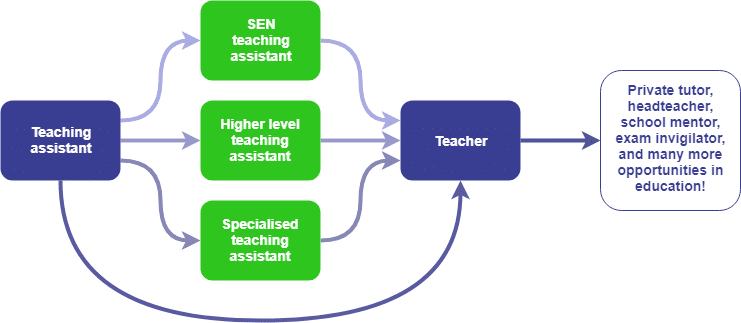
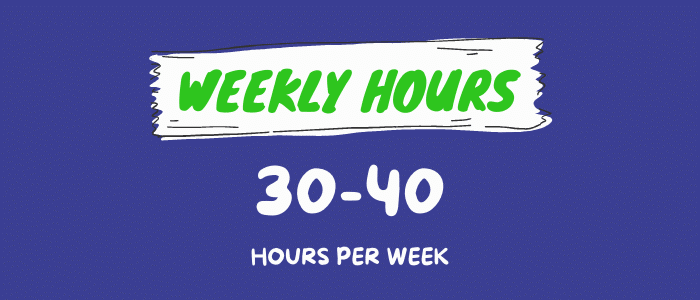
If you’re comfortable with the responsibilities of being a SEN teaching assistant, then you’ll need to ensure that you have all of the necessary skills and qualifications for the position and understand what exactly you can do to help yourself get started in a school setting.
You’ll need to meet the requirements for the job role you apply for, including any employer specific requirements. Pay attention to whether the job you’re applying for has any unique requirements compared to similar jobs and make sure you fulfil them before applying. There are a few things that you can do to improve your chances of landing the job when you’re looking to enter a career in education.
Though schools often set their own requirements for teaching assistants depending on theirs and their pupils’ needs, it’s a good idea to get a Level 2 Teaching Assistant qualification so you’ll have the knowledge that you’ll need for the position, as well as looking good to prospective employers.
Once you have your Level 2 Teaching Assistant qualification, you could look at expanding your skillset with a Level 3 Teaching Assistant qualification. You’ll be able to build upon your knowledge and earn a higher salary as you progress.
You could also need an A* to C grade at GCSE level in English and Maths or equivalent, depending on the workplaces you apply for, this is also a requirement for some teaching assistant apprenticeships and courses. If you don’t have either one or both of these you should look at taking either a Level 2 Functional Skills English course or Level 2 Functional Skills Maths course. A functional skills qualification is equivalent to having your GCSE qualification at this level, and can help you get into a wide range of jobs, not just in education.
Though not essential, having supporting qualifications can really improve your chances of getting the position that you want and help you to stand out among other applicants. Getting your supporting qualifications will let you demonstrate additional knowledge that other candidates might not have.
Since you’ll be working with children with special educational needs, you should look into a qualification in understanding autism. Having a greater understanding of autism and how it affects children could be very beneficial depending on the children you’ll be working with.
As a SEN teaching assistant there are a number of other supporting qualifications that could be helpful. A safeguarding and prevent course is going to equip you with the knowledge you need to help safeguard the students you’ll be working with, which is a hugely important part of the job. Employers, as well as parents, are going to feel confident knowing you have the knowledge you need to support the organisation’s safeguarding responsibilities to a higher level.
When working in schools it’s important that you have a first aid qualification in case of minor injuries that students might end up with. Depending on the employer, you might be given the option to receive this training before starting work but having the qualification beforehand can help put you ahead.
Any experience working in an educational setting will be invaluable to you when you’re looking at getting a position as a SEN teaching assistant. This experience could range from anything from previous work as a teaching assistant in schools to caring for children with disabilities or learning difficulties.
Many SEN teaching assistants start off as regular TA’s, so if you’re already in a position as a teaching assistant then you’re in an excellent place to get started.
If you don’t have any prior experience in a school environment then it’s good to highlight the transferable skills you’ve got from other work that will help you transition into the position.
If you need some experience in schools then it’s always good to volunteer at a local school. As well as being good for your CV, this could also lead to paid work.
You should make sure your CV includes your most up-to-date information, including any relevant qualifications and work experience you might’ve gained since you last updated it. Since we all know first impressions are important, and your CV is more often than not going to be the first thing potential employers will see, it’s essential that they’re done right.
To make the best impression you can, you’ll need to convey the right information and present it well. Given how important your CV is, we’ve created a short guide to help give you the best chance of landing an interview and starting your career in education!
When you’re looking at a position as a SEN teaching assistant, it’s crucial that your CV is high quality and reflects your passion for the role. An effective CV is well presented, displays relevant skills and experience, and gives your potential employers an insight into who you are.
It’s important that you use grammar correctly, that your writing is concise but informative, and any non-relevant information is left out. Not following these rules could mean your application is rejected, since employers could see it as too unprofessional. Our SEN teaching assistant CV writing tips are here to help you to land that position you’ve been waiting for!
Your personal profile is the first section of your CV that employers will read to find out more about you. This is your chance to introduce yourself, sell your skills and outline your characteristics. Personal profiles are a perfect way to persuade recruiters, as it tells them straight off why they should hire you.
This section can include relevant experience and achievements, but it’s important to tailor this to the job description and what’s prioritised there to show your enthusiasm for the role and that you’re a serious candidate for the position who has what they’re looking for.
There are no set rules on the length of this section but you should aim for a few short sentences and no longer than 100 words. This way you can keep it concise and effectively highlight who you are to employers without giving them too much information, increasing the chances of them reading through the rest of your CV and considering you for the job. Make sure you’re putting your best foot forward and presenting the things that you think make yourself stand out.
Though your CV should be more focused on your skills and work experience rather than your personality, it can be good to include some relevant personal information such as your hobbies in your CV, but what counts as relevant will vary from job to job.
There should be a section in your CV that outlines your relevant skills. This makes it easy for the employer to read and more easily determine if you meet the requirements of the role. You should format this section using bullet points so that it’s simple and easy for employers to read. Make sure to include relevant skills that you think make you a good candidate for the position. Such as:
If you’re struggling to think of skills that are relevant to the job then it’s a good idea to check vacancy advertisements for some ideas.
Start off by rereading the job you’re applying for and what might be useful to mention, but if you’re still stuck then take a look at other similar job postings. You should also think about which of your skills have been helpful in any of your past work or study.
It’s important when talking about your skills to try and include both hard and soft skills, so that you can show some variety. Hard skills are the skills you gain through experience, knowledge, or learning such as through a qualification or after undertaking training. Soft skills refer to your personal traits and habits that determine how you work, like being an effective communicator, able to work in a team, or organisational skills.
You should outline any past experiences in either work or volunteer positions that are relevant to becoming a forest school leader and can best show your potential employer the value that you’d be bringing to the position.
The most valuable experience you can have as a SEN teaching assistant is working in either the same position before or as a regular teaching assistant, you should present this work experience front and centre. Give details of where you worked, including the dates you started and finished your employment (these don’t have to be specific, usually the month and year are fine), alongside your key responsibilities within the role. If you have a lot of relevant experience then list it from most to least recent.
Employers will want to know more of what you’ve been doing recently rather than years ago, as it’s more relevant to the jobs you’ll be applying for now.
If you have no relevant experience then you should include any previous employment you’ve been in and the transferable skills you gained that will be useful in the role. Try and think about any similarities between your previous positions and the one you’re applying for. Is there anything listed on the job advertisement that sounds familiar?
Making sure you mention your education clearly on your CV is very important, as it will show that you have the knowledge and qualifications needed for the job. When listing your qualifications you should prioritise two things: the level of the qualification (is it a degree or a GCSE?) and when you received it. Much like your experience, it’s best to list your qualifications from your most to least recent.
When you’re listing your qualifications make sure you include the name of the institution, the dates you attended them from, the subject(s) you studied or name of the qualification, as well as the final grade you received. If there’s a particular aspect of your study that is very relevant to the position you’re applying to then it would be a good idea to briefly mention it at some point.
Don’t think you just need to include your experiences from school or university, things like standalone courses that award you with a certificate or diploma are more than relevant, especially if they cover a subject that’s relevant to your work. Add your certificates in the same way you’d add your other qualifications, providing any additional information as needed.
It might seem obvious, but having your contact details clearly signposted on your CV is extremely important, without them potential employers may have no way to contact you. You should include your up-to-date email, phone number, and address somewhere near the top of your CV so that they don’t get lost amongst the rest of your information.
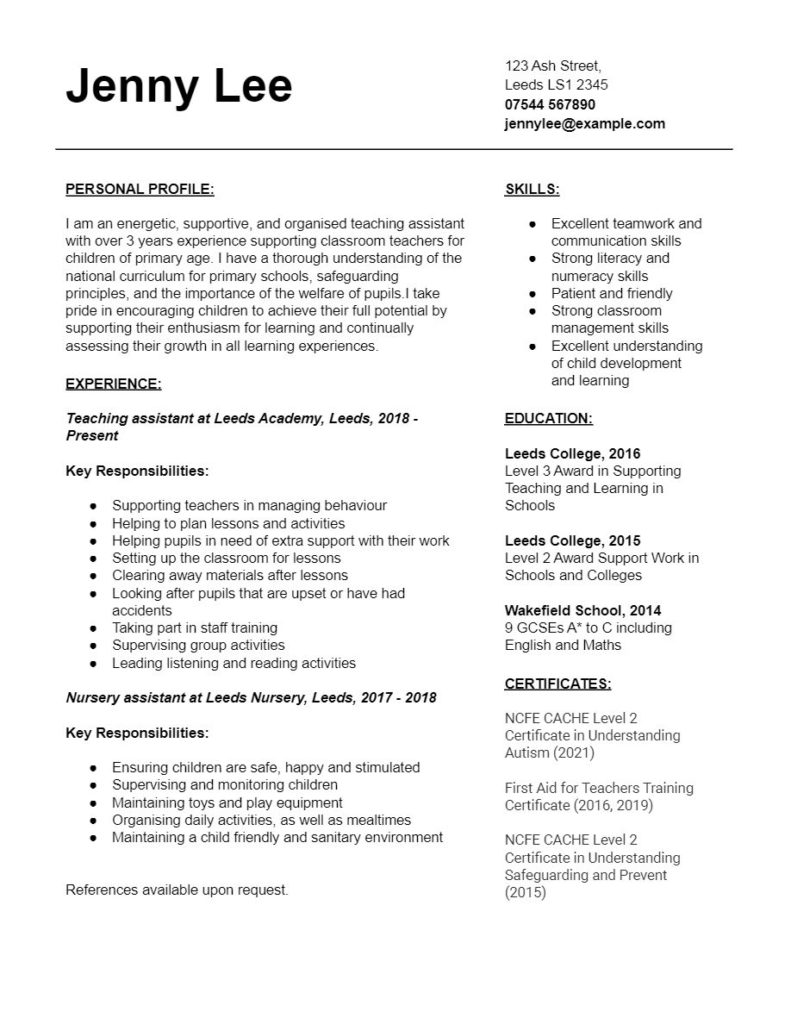
Struggling to put your CV together? Download our free CV template and get a head start on making a fantastic CV. Make sure to follow the rest of our tips and learn how to land that job you’ve always wanted!
Searching for a SEN teaching assistant position should be simple, and shouldn’t be any different from finding other jobs you’ve applied for before. Just make sure that the positions you apply for are a good fit for you and that you have all the necessary qualifications and you should have no trouble! Checking out our teaching assistant jobs around the UK could be a good start for your search.
You should write your cover letter using the job description of the vacancy you’re applying for. Your cover letter is an important part of many job applications.
No matter what kind of job you’re applying for, your cover letter is going to help demonstrate to potential employers the passion that you have for the role and allow you to sell yourself as a valuable candidate that they need to consider hiring.
Cover letters are your chance to really sell yourself to a prospective employer and progress to the next stage of the hiring process. This opportunity isn’t always fully exploited by candidates, and sometimes cover letters just become reworked CVs or are poorly planned and formatted.
The header of your cover letter should have your up-to-date email, contact number, and the current date, as well as the recipient’s contact information. You should start your cover letter with a greeting such as “Dear [Company] Hiring Manager” or “Dear Mr/Ms Surname”, if you know who you’ll be contacting directly.
When choosing your font you need to make sure it’s not only easy to read but also looks professional, as well as the right size. Try to stick between a size 10pt-12pt font on your cover letter, as making your font size too big could come across unprofessionally, but it should still be clear and legible. Make sure to split the main body of text into multiple paragraphs, this not only makes it easier to read but also easier to plan the structure of your cover letter (each paragraph might have a specific topic, for example).
It’s a good idea to sign off your cover letter using your name and a complimentary close. Using “Yours Sincerely” or “Your Faithfully” are seen as very formal, but can sometimes appear outdated, try using “Kind Regards” as a formal alternative that is still professionally acceptable.
Here are some suggestions for each of the paragraphs in your cover letter and what you might want to mention to your prospective employer:
We are interactive boxes, hover over us!
We are interactive boxes, tap us!
Introduction
Start by explaining why you're writing the letter, making sure to mention the job you're interested in by its specific title, you could also mention where you saw or heard about the vacancy. Give a brief sentence stating your experience or a relevant qualification.
Experience and Qualifications
Highlight your relevant experience or qualifications. Talk about relevant responsibilities you had in previous roles, and go into more detail about how this makes you suitable for the role--is there a particular achievement you're proud of in your previous work or study that is relevant to the job? Mention it here!
Skills
Discuss the skills you have that are relevant to the job and make sure that you mention how they make you well-suited for the role. Always be showing the employer what you have to offer them if they were to hire you.
Final note
Reiterate your interest in the role. Outline your motivations for not only working this type of job but why you want to work for this employer. It's a good idea to include some relevant knowledge about your potential employer, as it shows you are taking an extra interest.
A good way of making your cover letter stand out from other candidates is by tailoring it to the particular role you’re applying for. It’s always easiest to look back through the job posting and pick out relevant information like the job title and employer and making sure to mention them early on. This will show your employer that your cover letter is tailored towards them, rather than being something generic you’re sending around to every employer.
When you’re going through the job posting take note of the specific skills and experience listed as desirable by the employer, you can tailor the skills and experience you mention to what they’re looking for. Try not to follow along too closely and risk looking like you’ve just copied the advertisement, but do enough to show that you’re the ideal candidate. Order your skills, experience, and qualifications in order of relevancy–what’s highlighted or mentioned first in the job posting? Is there something very specific that they’re looking for? Make sure you bring it up!
Now that your cover letter is well-formatted, has the main body of it’s content written, and has been tailored to the job role, it’s time to put the finishing touches to your work.
Proofread what you’ve written a few times over to check for punctuation or grammar errors and how well your writing flows. Try and enlist the help of a friend or relative to give it a read over, they may spot something you missed!
Now you should go back to the job vacancy and re-read all of it. Check if there are any special instructions you should follow when applying for the position, like if they’re asking for the documents to be submitted as a particular file type or maybe want you to add a job reference number to your cover letter. Make any of the changes you need and ensure everything’s in order. Overlooking small things like this could ruin your otherwise perfect cover letter!
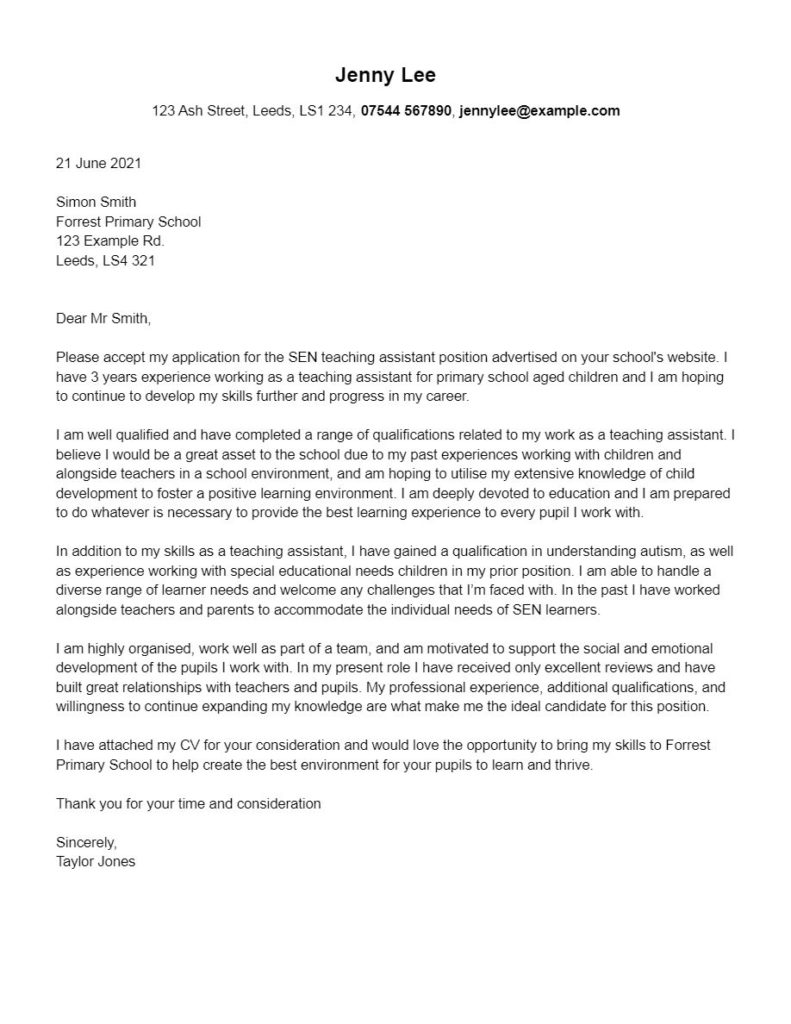
Struggling to put your cover letter together? Download our free cover letter template and get a head start on writing an amazing cover letter. Make sure to follow the rest of our tips and learn how to land that job you’ve always wanted!
We all know that job interviews can be nerve-wracking, but being well prepared for the interview will help you to appear calmer and more confident. It might seem obvious, but make sure that you always present yourself professionally at interviews, dress well, and always be polite. First impressions can make or break your chances!
Interviews can be daunting and hard to prepare for–especially if you don’t have much experience–but we’re here to help you out.
We’ve compiled a list of common questions that you might be asked in your interview for an early years job and how you should go about answering them, as well as some questions you can ask your interviewer to help show your interest in the position!
This is possibly the most common SEN teaching assistant interview question. The interviewer wants to see that you have a genuine interest in the role, so when asked this question be sure to show your passion and dedication. There are many great reasons for becoming a SEN teaching assistant, but it’s important to talk about your own experience in your reply.
This will differ for everyone but it’s important to let your employer know that you’re highly motivated for the position and won’t collapse under the sometimes challenging scenarios you’ll be dealing with on a regular basis.
Knowing how to work with SEN pupils’ parents is just as important as knowing how to work with the pupil themselves. It is good to demonstrate your understanding of the importance of this by discussing ways you will work with them.
You could talk about keeping regular communication with parents or carers, keeping communication consistent and through a number of channels, building a relationship of trust, being able to understand how to work with a particular family or parenting dynamic.
Often, the pupils you will be working with will have behavioural issues so you will need to know how to deal with this in the classroom. When asked this question, you need to show that you understand the nature of the role and highlight your capability.
You could go into detail on what actions you would take if a pupil was being disruptive, or you could give an example of a time you have had to use your behavioural management skills in previous work.
Pupils often work more effectively in a positive classroom atmosphere, and when they feel comfortable around the staff. When answering this question, talk about a few ice breaking methods that are useful when developing a trusting relationship with the pupils.
If you can think of any other challenges, specifically relating to your work with SEN children, make sure to mention them and how you would deal with them. Being able to demonstrate your knowledge of best practices is going to give your interviewer the confidence that you can handle yourself in the role.
You should ensure that you have a good knowledge of the various safeguarding responsibilities that educators have and the particular challenges that you’ll face when working with children with special educational needs.
Safeguarding is extremely important in a school setting so being able to show your knowledge of the issues will impress your interviewer and reassure them that you’re able to handle all of your responsibilities.
This is an opportunity to sell yourself. The interviewer wants to know if you are an ideal fit for the job and if you will bring value to the school. You should talk about all the skills you possess which are crucial for the role, such as excellent communication skills, your ability to handle difficult situations, patience, flexibility and your ability to work cooperatively with others (pupils, parents and teachers).
This requires a simple answer as you are just talking about yourself and your own experiences with SEN students. It is a good idea to provide examples of the types of SEN pupils you have worked with and show your understanding of the issues that affect pupils with varying educational needs.
This is important if you’re working in a specialised setting but can also apply to any nursery. You might not have any experience in this which is totally fine, if you do have no experience then talk about your willingness to learn instead and how past experiences or knowledge from your study might help in this situation.
Reading through some of our common questions should help get you in the right headspace for your exam invigilator interview, but don’t stop here–have a think about what other kinds of questions you could be facing, as well as how you might answer them on your own (an answer that comes from you will always be better than something generic)!
Learn about a SEN teaching assistant’s role and responsibilities
Improve your chances of getting a position as a SEN teaching assistant
Make sure your CV is up-to-date
Search for SEN teaching assistant jobs you can apply for
Write a job-specific cover letter
Prepare for interviews
Learn about a SEN teaching assistant’s role and responsibilities
Improve your chances of getting a position as a SEN teaching assistant’s
Make sure your CV is up-to-date
Search for SEN teaching assistant jobs you can apply for
Write a job-specific cover letter
Prepare for interviews
After reading through our guide, you should be ready to embark on a new career as a SEN teaching assistant with the confidence you need to excel. If you follow our tips then you’ll be more than ready to get the job role you’ve been looking for! Good luck, and if you need any more advice on other career options, don’t forget to take a look through our career advice page.
| Cookie | Duration | Description |
|---|---|---|
| cookielawinfo-checkbox-analytics | 11 months | This cookie is set by GDPR Cookie Consent plugin. The cookie is used to store the user consent for the cookies in the category "Analytics". |
| cookielawinfo-checkbox-functional | 11 months | The cookie is set by GDPR cookie consent to record the user consent for the cookies in the category "Functional". |
| cookielawinfo-checkbox-necessary | 11 months | This cookie is set by GDPR Cookie Consent plugin. The cookies is used to store the user consent for the cookies in the category "Necessary". |
| cookielawinfo-checkbox-others | 11 months | This cookie is set by GDPR Cookie Consent plugin. The cookie is used to store the user consent for the cookies in the category "Other. |
| cookielawinfo-checkbox-performance | 11 months | This cookie is set by GDPR Cookie Consent plugin. The cookie is used to store the user consent for the cookies in the category "Performance". |
| viewed_cookie_policy | 11 months | The cookie is set by the GDPR Cookie Consent plugin and is used to store whether or not user has consented to the use of cookies. It does not store any personal data. |